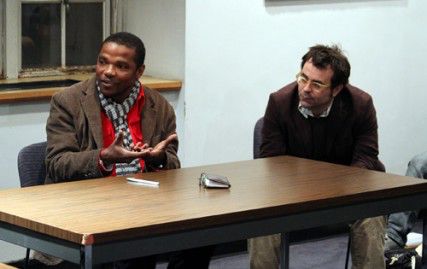
Brazilian racism toward African-Brazilians is fueled by more than a century of discrimination and reinforced by the country’s media, said professor Fernando Conceicao in a lecture on Monday. Conceicao, who is a journalist and professor in the Multidisciplinary Graduate Program in Culture and Society at the Federal University of Bahia, Brazil, gave a lecture in the College of Arts and Sciences on race, media and affirmative action to an audience of about 40 students.
An activist in the Brazilian Black Movement, Conceicao said he is involved in the struggle for implementation of affirmative action policies in Brazil, where matters of race are “very complex.”
“People don’t stand up to their backgrounds,” he said. “Colonial powers defined the social powers of the people.”
In the past, the Portuguese state assigned roles of slaves and property owners to people of all races. Today, people are going against these norms, fueling a social uproar, Conceicao said.
Conceicao said he believes that redefining the aspect of racial equality is not only for the benefit of Afro-Brazilians but also for white Brazilians, creating a country that will welcome all races.
However, the movement is delayed in Brazil because of the archaic mentality that the elite and middle classes share, Conceicao said.
“I don’t want to give the idea that there will be a civil or a racial war, but I just want [to raise the] consciousness of whites and elites. War would lead nowhere,” he said.
Conceicao expressed an admiration for how far civil rights for African-Americans have come in the United States, a country where black people comprise 12 percent of the population.
He said his main purpose for moving to the United States was to interchange American and Brazilian ideas, subsequently comparing how the two different societies depicted racial relations, particularly in the media.
Conceicao compared newspapers from Sao Paulo, Brazil and American publications such as The New York Times.
“The [Brazilian] media seems to block any chance of Brazil becoming a Democratic country,” Conceicao said. “A democratic newspaper should, in theory, represent the diversity of opinions.”
He explained that activists who wanted to be published had to buy space on a newspaper page, which can cost up to $200,000, just to make their opinions heard.
CAS junior Jacqueline Argueta said she found the lecture to provide a unique perspective on racism outside of the United States.
“It was especially interesting learning about racism that still persists,” she said. “I think it’s important to learn about different issues in different countries.”
Argueta said it was definitely important to raise BU students’ awareness of social and racial issues in other countries.
“Especially for those studying International Relations and especially because of globalization, we should be more in contact with outside countries,” she said.
Motioning to the room full of professors and students, Coneicao thanked his audience for representing the BU community’s concern towards racism around the globe.
“All these people are interested in the debate and in journalism. I say ‘thank you.’”
This is an account occasionally used by the Daily Free Press editors to post archived posts from previous iterations of the site or otherwise for special circumstance publications. See authorship info on the byline at the top of the page.



